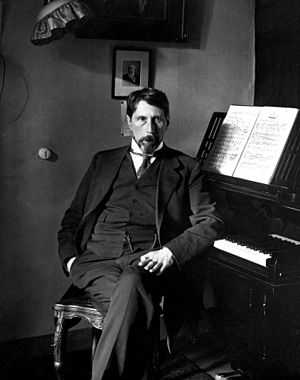Johan Wagenaar

Johan Wagenaar (1 November 1862 – 17 June 1941) was a Dutch composer and organist.
Life
Born in Utrecht, out of wedlock, he was the son of Cypriaan Gerard Berger van Hengst and Johanna Wagenaar. Wagenaar's parents were of different social strata: his father was an aristocrat, while his mother was of more humble origins.[1] For this reason, Wagenaar's parents were not married, and thus Wagenaar received his mother's name as his family name. While Wagenaar resented that his parents never got married, he was by no means neglected by his father.[2]
Wagenaar evidenced a talent for music as a child. However, he did not begin to receive a formal education in music until age 13, with subsequent instruction in piano, organ, violin, theory, and composition. He was under the tutelage of the composer Richard Hol and the organist Samuel de Lange, Jr. In 1892, he studied with Brahms' friend Heinrich von Herzogenberg in Berlin, specifically taking lessons in counterpoint.
In 1888, he succeeded Richard Hol as organist of Utrecht Cathedral, and earned fame for his skills at organ performances. In Utrecht, Wagenaar became a teacher at the music school in 1896, and the school's director in 1904. He also received an appointment with the Utrecht Municipal Orchestra (Utrechtsch Stedelijk Orkest). Between 1919 and 1937, Wagenaar was director of the Royal Conservatory at the Hague. His pupils included Peter van Anrooy, Emile Enthoven, Henri van Goudoever, Alexander Voormolen, Leon Orthel, Allard de Ridder, Willem Pijper and Bernard Wagenaar.[3] See: List of music students by teacher: T to Z#Johan Wagenaar.
On 23 July 1897, Wagenaar married Dina Petronella van Valkenburg. They had two daughters.[4] He died in Den Haag.
Works
Wagenaar's compositions include operas, cantatas, organ music, and orchestral works.[5] The music of Hector Berlioz had a modest influence on his works, but a much more pronounced influence was Richard Strauss.
In his later years, Wagenaar received an honorary Doctorate of Music from Utrecht University.
Partial list of compositions
- De Schipbreuk, cantata (1889)
- Frithjofs Meerfahrt, overture op. 5 (1884)
- King Lear, overture, op. 9
- Romantic intermezzo, op. 13
- Levenszomer, fantasy for orchestra, op. 21
- Cyrano de Bergerac, overture, op.23 (1905)
- Saul en David (Saul and David), symphonic poem, op. 24 (1906)
- De getemde feeks (The Taming of the Shrew), overture, op. 25 (1909)
- De cid, op. 27 (1908)
- Symphoniëtta, op. 32
- Driekoningenavond (Twelfth Night), overture, op. 36 (1928)
- Wiener Dreivierteltakt, waltz cycle, op. 38 (1929)
- De Philosophische Prinses, overture after Carlo Gozzi, op. 39
- Larghetto for oboe and orchestra, op. 40
- Aveux de Phèdre for soprano and orchestra, op. 41 (text by Jean Racine)
- Amphytrion, overture, op. 45 (1938)
- De koopman van Venetië (The Merchant of Venice), opera after Shakespeare
- Calme des nuits, song for a cappella chorus
- Feestmars (1937)
- Elverhoï, symphonic poem (1940)
References
- ↑ van Hasselt, Luc, Notes to Decca CD recording of music of Johan Wagenaar, Catalog Number 425-833-2, 1990 (translated by Tilly Mulder).
- ↑ Jaap van Benthem (2004) Johan Wagenaar (1862–1941): Leven en werk van een veelzijdig kunstenaar. Walburg Press, Zutphen, ISBN 9057303345
- ↑ Jos Wouters and Harrison Ryker. "Wagenaar, Johan." In Grove Music Online. Oxford Music Online. (Subscription required). Accessed 29 January 2009.
- ↑ Jansen, P.M.F., Online biography of Johan Wagenaar. Instituut voor Nederlandse Geschiedenis, 2003. Inghist.nl (17 June 1941). Retrieved on 14 March 2014.
- ↑ Johan Wagenaar at the Wayback Machine (archived June 10, 2007). donemus.nl
External links
| Wikimedia Commons has media related to Johan Wagenaar. |
|